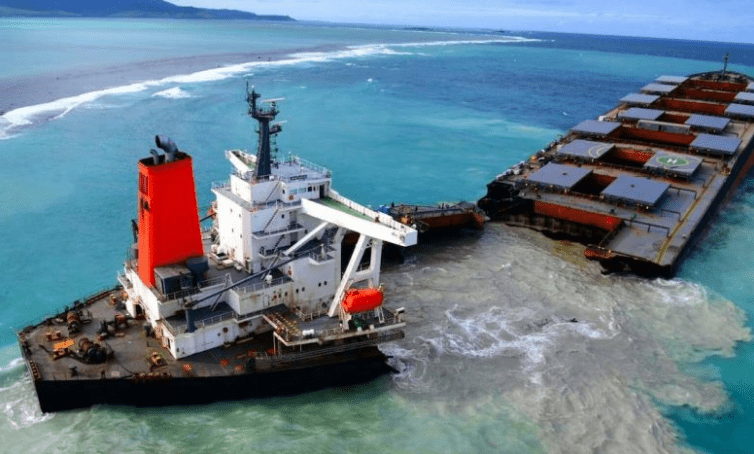The International Transport Workers’ Federation (ITF) has decried the criminalization of seafarers and called for the immediate release and repatriation of the crew members of the large capsize bulk carrier MV Wakashio, which ran aground in Mauritius one year ago.
ITF said the crew members of the ship are still being held by the authorities.
On July 25, 2020, the Panama-flagged bulk carrier, operated by Mitsui O.S.K. Lines, deviated from shipping lanes and ran aground on Mauritius Pointe d’Esny, eventually breaking up and spilling some 1,000 tonnes of oil which seeped into pristine lagoons and causing the island-nation’s worst environmental disaster.
A few weeks after the grounding, the ship’s captain and chief officer were arrested and charged with endangering safe navigation. They are currently being held without bail as they await trial. Most of the remaining crew remain under ‘house arrest’ in a local hotel, without charge, as they may be required to appear as witnesses in the trial, the ITF said.
While the grounding remains under investigation by the ship’s flag state (Panama), preliminary investigations indicate the Wakashio deviated from shipping lanes to pick up cell service during a birthday celebration.
“This week marks the one year anniversary of the grounding of the MV Wakashio and the environmental catastrophe associated with it. This week also marks one year since the Mauritian authorities have held members of the crew and prevented them from leaving the Republic, most have been effectively detained without charge,” ITF Seafarers’ Section chair, David Heindel, said.
In a letter to Mauritius’ president, Heindel and the ITF expressed “deep concerns” about the treatment of the crew and appealed to Mauritian authorities to consider the human cost that delayed proceedings and unnecessary detention would have on the seafarers and their families.
“The ITF supports thorough, independent investigations of the factors relating to any maritime incident, including those that may have affected the grounding of the MV Wakashio. In this instance, we are concerned about the lack of appropriate legal proceedings taking place regarding the Wakashio crew,” said Heindel.
“While, in a particular context, criminal charges against seafarers may be justified, it is important that people have access to justice and are treated fairly. Access to justice and fair treatment by the authorities are fundamental human rights guaranteed by the Universal Declaration of Human Rights. We believe the treatment experienced by the crew of the Wakashio violates their human rights,” Heindel stated.
Heindel said that while the Wakashio accident was “deeply unfortunate”, the incident highlights concerns regarding the criminalization of seafarers when disaster strikes, pointing to other examples such as the Ever Given incident in Suez.
“Criminalization of seafarers is on the rise. Whether it is felt by the crew of the Wakashio who were effectively detained without charge, or the drawn-out threat of criminal charges against the Ever Given crew to bolster the Suez Canal Authority’s negotiating position over damages: seafarers are being cynically targeted all over the world by officials just for doing our jobs,” said Heindel.
“We know that seafarers are seen by some officials as convenient bargaining chips in efforts to hold shipowners to account for maritime accidents caused by issues like a lack of maintenance. This is especially the case when a state finds it difficult to locate and prosecute irresponsible shipowners who too often hide behind the Flag of Convenience system,” Heindel added. “But the solution to irresponsible shipowners ducking accountability for maritime accidents is not to hold seafarers hostage, but rather to reform the Flag of Convenience system and abolish the secrecy protections which allow anonymity and evasion.”
Drawing parallels to the Wakashio and Ever Given incidents, the ITF is also highlighting the arrest of seafarers in the cases of drug trafficking offenses. In a case just this month, Turkish law enforcement officers found 176 kilograms of cocaine hidden in packages inside a container aboard the MSC Capucine. The authorities arrested the master of the vessel and three deck officers at Iskenderun, Turkey and continue to hold them.
“The arrest of the four crew in Iskenderun, Turkey is just the latest example of where seafarers are criminalised and treated poorly when there exists no evidence at all that they were involved in the alleged crimes. Once again, it seems authorities have decided to pin the smuggling offense on innocent seafarers,” said Heindel.
Unless there are hazardous materials within containers, crew typically have no knowledge of what is inside them and containers are sealed before being loaded onto a vessel, said Heindel.
In a similar case in July 2019, the crew of the US-flagged bulk carrier UBC Savannah were arrested in Mexico and held without charge or trial in poor conditions after cocaine was found in the vessel’s cargo hold. While most the crew were released shortly after their arrest, the Polish captain was held until March 2021 despite reporting the drugs immediately to the authorities and ordering the halt of all cargo operations once the drugs were found.
“These high-profile cases are just the tip of the iceberg that the world gets a glimpse of through the press,” said Heindel.
“Every day, seafarers face unfair prosecutions and detentions all over the world. They are being denied justice through a lack of impartial trials, poor or non-existent access to legal representation and translation services, and – in some jurisdictions – enormous financial barriers prevent seafarers from accessing their rights to bail and appeal,” he said.
